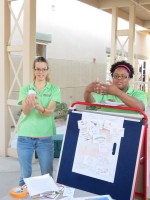It's 4 o’clock in the afternoon, and about 10 three to eight year-olds are seated around a table listening to Ecology Explorers intern Alexis Roeckner present a lesson about sustainability. Roeckner holds up a picture and asks: ”What is this?” Opinions abound; voices ring out left and right, with sometimes funny interpretations of the photo. From the back of the group, one timid voice says, “It’s for wind.” All faces turn toward the speaker, one of the smallest boys in the room. It is the right answer. Roeckner confirms that the object in the photo is indeed a wind turbine and explains its function to the energetic little children.
For Roeckner it is just another teaching moment in the Homeward Bound after-school program. Yet this is not a typical school-based, after-school program. As an organization Homeward Bound provides transitional housing, employment services, and other forms of support to low-income families with children that are homeless, recently evicted, or fleeing a domestic violence situation. The after-school program is located in a residential community run by Homeward Bound, where children live with their mothers. The program is one of Homeward Bound’s efforts to provide educational enrichment to children in this community, which isn’t well-served by typical STEM (science, technology, engineering, and mathematics) programs, in part because the community’s population is very mobile.
The Central Arizona-Phoenix (CAP) LTER’s K-12 education program, Ecology Explorers, started working with Homeward Bound in fall 2013. Ecology Explorers interns, student workers, and graduate fellows designed and delivered lessons to groups of 10-15 children four times a semester, overseen by Ecology Explorers staff member, Gina Hupton.
During the fall, lessons focused on urban ecology and urban microclimates, while the spring lessons ranged from understanding the water cycle to considering the effect pollution has on the environment. Gina explains that the lessons were meant to provide a foundation for future learning in academic classrooms as well as to help the children understand and appreciate the environment around them.
Lauren Gault, an Arizona State University (ASU) undergraduate student working with Ecology Explorers, agrees with Hupton. “Young children still find much of the scientific world to be magical and mysterious. Exposing them to science early and often is essential to making science more accessible, more influential on their thinking, and less enigmatic,” she explains.
The benefits of the Homeward Bound program extend to the ASU students who have worked with the children over the past year. Roeckner, for example, is considering an education-oriented career thanks to the experience that she had delivering environmental education to groups like Homeward Bound during her internship. Gault, who is majoring in Conservation Biology and Ecology with concentrations in Sustainability and Public Policy, would like to focus on research, policy, and education. She recognizes the considerable power of science education and communication in shaping a sustainable future.
Ecology Explorers will continue providing environmental education lessons to children at Homeward Bound after-school during the next school year. However, it will likely be to a different group of children as families typically leave the program after mothers secure employment and housing outside the Homeward Bound community. Nonetheless it will be another chance for Ecology Explorers student interns to take a small step toward educating the next generation of environmentally-aware citizens.

 Enlarge this image
Enlarge this image